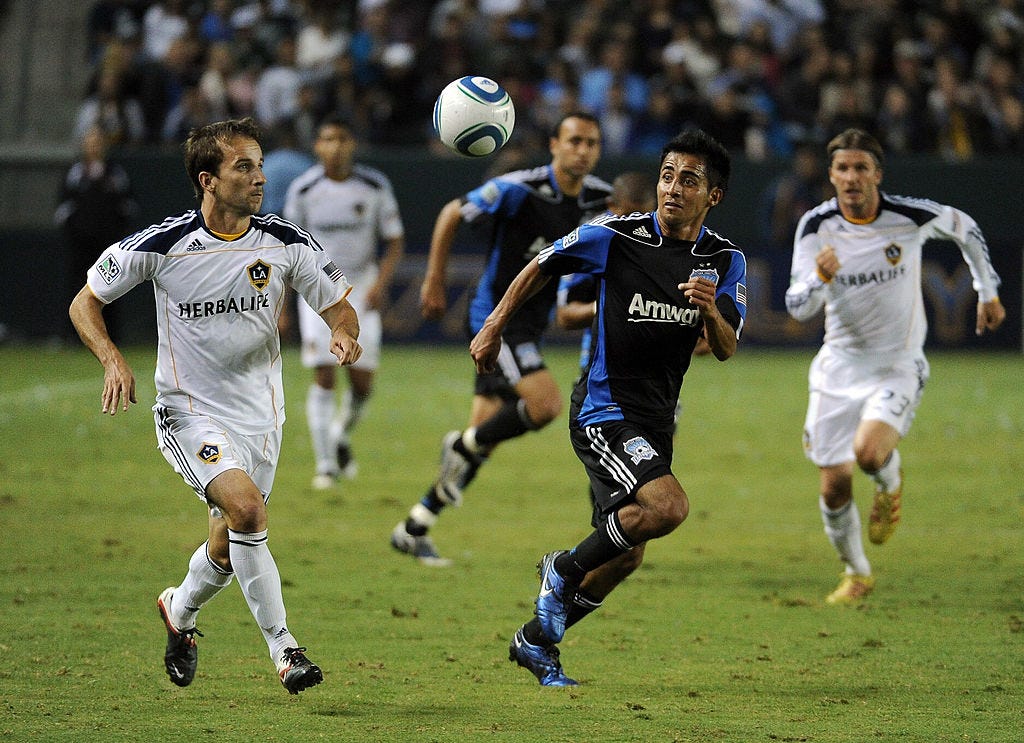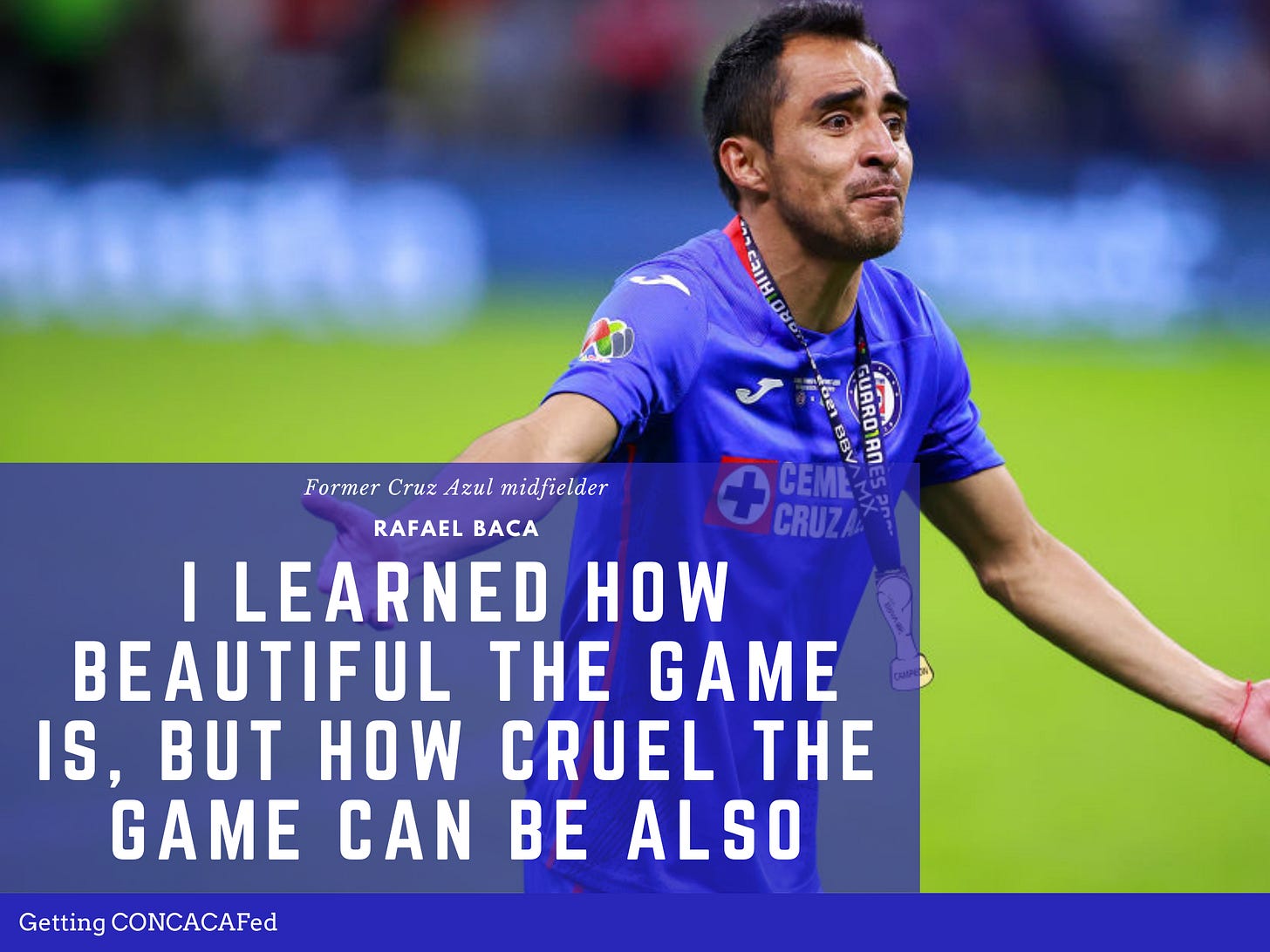🇺🇸🇲🇽 'I learned how beautiful the game is, but how cruel the game can be also' - Rafael Baca knows where he's from & where he's going
Baca opens up about his immigrant journey, becoming a hero & a villain at Cruz Azul, & his last chapter.
Rafael Baca remembers it in flashes. Moments, really. The extreme heat. The extreme cold. The minutes ticking by when it wasn’t clear if his little sister, suffering from extreme dehydration, would make it through the journey.
He was only six, but these are things you don’t forget, even after settling into a ‘normal’ life in Southern California. These are things that flashed through his head again when he was sitting in an office in Guadalajara 15 years later, watching as even the consulate employee shook his head and said, “I can’t believe I’m telling you no, but….” rules are rules, as he handed down a 10-year ban on Baca re-entering the United States.
Those moments are the ones that make rough times, like getting jeered by his own fans, feel like nothing, problems he only could’ve dreamed of having for most of his life.
Now, as the 34-year-old midfielder’s long playing career nears its end, Baca is back in California embarking upon a new dream: Setting his own children and other young people up for success, thanks in no small part to the decisions his parents made and the journey he took.
Baca refused to let his life be defined by the documents he did or didn’t have in his possession.
After going with his grandparents from Michoacan to Southern California where his parents already had moved, he had a childhood like any other kid in LA, at least any kid who was exceedingly good at soccer.
His high school coach received letter after letter and fielded calls from interested college coaches, but the phone would stop ringing after they learned Baca was undocumented.
"All these doors started shutting,” Baca said. "“That’s when I realized the magnitude of the problem I was going to face.”
At Loyola Marymount, he found a university willing to work with him but then saw the situation repeat. After a stellar college career, making three consecutive first-team West Coast Conference teams from 2008-2010, his immigration status kept him from receiving an MLS combine invite. He wasn’t selected in the draft. But a chance meeting at a funeral with a member of the San Jose Earthquakes coaching staff finally led to Baca getting a chance to trial with the team.
“We’re going to help you,” Baca remembers Quakes manager Frank Yallop telling him after he’d explained why he wasn’t at the combine or signed by another team.
That kicked off a process of trying to receive a P-1 working visa, easier said than done for anyone who entered the country without documents, whether a soccer player, a cello player or a painter.
From February until May of 2011, Baca trained in the morning and worked to get his documents in order in the afternoon. It was a frustrating experience as Baca waited to learn whether he would be able to live the American dream he felt within grasp or if his life would fundamentally change.
That’s how Baca ended up in Guadalajara, turning himself in for arriving to the U.S. with his grandparents as an elementary-aged kid and knowing if he was approved he’d be an MLS player and if he wasn’t he’d have to build a life in Mexico.
“I never told my mom I could be banned for 10 years. I told her it was going to take a week, but I knew there was a risk,” Baca said. “But I just said, ‘I gotta go. I have nothing to hide.”
Even after meticulously preparing his case, Baca was hit with that ban, keeping him from legally entering the United States from 2011 until 2021. The date and the pain it brought still comes to his mind quickly: May 19.
Soon, though, he was able to get a waiver that allowed him to enter the country, renewing his visa each year after proving he hadn’t been involved with illegal activity.
“I was approved July 6. In those two months, I was learning how to be patient because there’s nothing you could do,” he said. “I didn’t know Mexico. I left so young.
“I was in a place I didn’t know and felt like a stranger walking through places where you feel everyone is just looking at you as the new guy. It was challenging.”

Even still, later in life as he turned up with other star soccer players for international friendly matches or to visit family, Baca would be sent to secondary inspection, waiting in a room, sometimes for as long as three hours before he was able to continue on.
And trips between the two countries were frequent for Baca, since after three seasons with Yallop’s Quakes, Cruz Azul came calling and he went to play for one of the biggest clubs on the continent.
Listen to Baca speak about Cruz Azul and you hear his love for the club seep through his words. He’s eager to share about the history, how the team represents not just a soccer franchise but the hopes of workers from the Cruz Azul cement company, how it has tradition dating back to the team’s start in the 1920s as the club of the company town.
“I felt once I got to know that, to know the different plants, the cementeras in different states, I started realizing this is something I started loving and caring about,” he said. “When you have that connection, that’s when the love starts growing in you as a person toward the team.”
Baca put himself in that long history by winning a starting job in the midfield and holding it down season after season. He kept his role despite managerial changes, fighting off new signings to stay in the XI. For a period, he didn’t have the right documents for Mexico, either, being counted as a foreign player because he wasn’t developed in Mexico.
Beyond longevity, Baca was part of the historic Liga MX title run in 2021, starting 20 matches and controlling the midfield as La Maquina won its first title since 1997. That championship stopped the longest drought for any of Mexico’s four grandes and was a cathartic release after many near-misses.
“I knew the time was coming and obviously it all paid off and all was worth it because we ended up winning after almost 24 years,” Baca said.
Yet rather than kick off a new era of glory, it turned out to be a brief flash. Changes in the front office meant manager Juan Reynoso made way, and other key players also headed for the exits. As results got worse, fans looked for a scapegoat and found it in two of the players they knew best - Baca and defender “Cata” Dominguez.
“I learned how beautiful the game is, but how cruel the game can be also,” Baca said.
His performances came under unusual scrutiny, with fans even booing every time he got on the ball. Eventually, it became untenable and, with Baca’s contract expiring in July of this year, it was time to move on. Cruz Azul sent him off with a tribute video thanking him for nearly a decade of service. Even that got a mix of appreciation and hate.
“I think I made certain mistakes against opponents that were big rivals, and that’s what cost me the love from the fans because it was drastic, too. It was from one month to another loving me to hating me,” Baca said. “At the end of the day, I felt that every time I stepped on the field I knew what the team needed from me and proved that.”
That pain doesn’t compare to the mental scars left from migrating or being denied opportunities because of his immigration status, but that doesn’t mean the pain wasn’t still there.
Reuniting with Yalop at Monterey Bay FC of the USL Championship, though, made for a pain-free landing spot for Baca and his family as he prepares to transition into his post-playing career.
Between playing for a grande and making history with that team and the relatively low profile MLS still had more than a decade ago when he was in the Quakes midfield, Baca is certainly more famous in Mexico than the U.S.
Yet, he once again is choosing to make the U.S. his home, waiting this offseason to see if he’ll return to Monterey Bay or if an MLS offer may come during the winter.
No matter where his club future is, Baca and his family want to put down roots in the U.S. He opted to join Monterey Bay so he could begin to take USSF coaching badge courses and start working with young kids, especially Latinos, playing soccer in the U.S.
“I feel like with the story I have, I can touch a lot of players and guide them to the best possible way to help, with what I lived in my career,” he said. “With my story and the experience I have, I can give back to the community and help a lot of young talents make good decisions.”
The trip in the desert, the struggles with documentation, the boos in the Azteca? Those memories and challenges never go away. But when Baca draws on those experiences it will be other memories flashing through his head: Making his MLS debut, lifting the Liga MX trophy, scoring golazos from outside the box, playing with his kids in the park, loving the sport and the community it gave him.







I didn't realize this was the situation for him. I just saw him as a player that went through these stages as a list of soccer teams. This is a great article to highlight everything that went into that!
great read. forgot Baca was an "extranjero" in ligamx